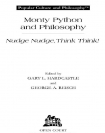Monty Python and Philosophy, Gary Hardcastle [portable ebook reader TXT] 📗

- Author: Gary Hardcastle
Book online «Monty Python and Philosophy, Gary Hardcastle [portable ebook reader TXT] 📗». Author Gary Hardcastle
The problem, I would suggest, is one of legitimacy. King Arthur’s quest for the Grail is only legitimate if his claim to leadership is legitimate. We are given reason to doubt that claim early in the film. A peasant woman asks how he came to be king. Arthur explains: “The Lady of the Lake, her arm clad in the purest shimmering samite, held aloft Excalibur from the bosom of the water signifying by Divine Providence that I, Arthur, was to carry Excalibur. That is why I am your king!” Another peasant argues, reasonably enough, that “strange women lying in ponds handing out swords is no basis for a system of government. Supreme executive power derives from a mandate from the masses, not from some farcical aquatic ceremony.”
A hero, in short, can only serve as a model for us to emulate if his cause is justified. While Arthur claims divine support, the basis for his claim is, on reflection, disturbingly mythical in character. Tyrants who do not posses genuine grounds for their power often appeal to such mythic claims to maintain their power. The troublesome character of Arthur’s ambitions is starkly demonstrated by his decision to declare war on the French in an effort to take “his” grail from them by force.
Religion and Rules: Deontology and Monty Python’s Life of Brian
If genuine divine support could serve as the basis for a good life, perhaps we should consider religion as the source of guidelines for this purpose. Religion appears to provide absolute rules that we can follow in our effort to be moral. The appeal to rules rather than overall happiness or virtuous character is associated with yet another basic approach to morality, one called deontology. Deontology asserts that what makes an action right or wrong is solely whether it conforms, or fits, to one’s duty. One challenging aspect of deontology is determining what duties we have. Religion supplies a possible answer to this question.
Monty Python’s Life of Brian has religion as a central topic, so it is not surprising that it can provide us with illustrations of the difficulties involved in drawing on religious rules. It’s worth noting that, while this film is certainly critical of religion, several scenes suggest that we are not to understand Brian as Christ—for example, when Brian is born, the three wise men leave his cradle to visit another newly born child. In contrast to Brian’s stable, this other child’s stable is lit by a holy light. The primary target of the movie is religious dogmatism rather than the figure of Christ.
Early in the film, Brian and his mother are at the back of a crowd listening to a sermon. It is reasonable to assume that this sermon is being given by Christ (another clear case of separation between Christ and Brian). At this great distance, it’s difficult to hear, and a member of the crowd reports that the speaker has just said, “blessed are the cheesemakers.” This example brings out the fact that before we can apply a moral rule we must have the right rule in mind. Even if a moral rule has a divine source, there is room for error right from the beginning—there are many ways for the text to be corrupted. Moreover, trying to fix a corrupted text can lead to its own problems. One of the crowd members confidently clarifies the rule by saying, “Well, obviously it’s not meant to be taken literally; it refers to any manufacturers of dairy products.” We cannot simply rely on the words, even if we do not take them literally. We have to develop an interpretation of the words.
Later in the film, Brian needs to escape from the Roman guards and literally drops into a group of prophets. To disguise himself, he needs to pretend to be a prophet. With this goal in mind, Brian attempts to reproduce a parable we assume he has heard from Christ. The crowd does not respond well.
BRIAN: Consider the lilies . . .
WOMAN: Consider the lilies?
BRIAN: Oh, well, the birds, then.
FIRST MAN: What birds?
BRIAN: Any birds.
SECOND MAN: Why?
BRIAN: Well, have they got jobs?
THIRD MAN: Who?
BRIAN: The birds.
SECOND MAN: Have the birds got jobs?!
FOURTH MAN: What’s the matter with him?
THIRD MAN: He says the birds are scrounging!
BRIAN: Oh, no, no, the point is: the birds, they do all right, don’t they?
FOURTH MAN: Well, and good luck to them!
SECOND MAN: Yeah, they’re very pretty.
BRIAN: Okay. And you’re much more important than they are, right? So what do you worry about? There you are! See?
Even if we have the right rule and are attempting to interpret it, we can still go awry. Brian’s failure to communicate a meaningful message to the crowd reflects his limited understanding of the parable. Interpretation is a challenging process, and simplistic understandings of the rule will not be sufficient to provide us with guidance. It is worth noting that the problem of interpretation is not restricted to parables or metaphors—even the most straightforward rules pose challenges, as the priest supervising the stoning of the blasphemer discovers. The blasphemer chants ‘Jehovah’ repeatedly, leading the priest to say “If you say ‘Jehovah’ once more . . .” at which point the priest himself is stoned by the crowd. The priest and the crowd have different interpretations of just what the rule against blasphemy entails, and there is no obvious way to adjudicate between them.
The dangers of blind obedience to authority are illustrated when Brian unintentionally gains a collection of followers. He tries to convince them that he is not the Messiah, but they do not listen. “Only the





Comments (0)